Essay: Australian Nursing Industry, Skills, and Professional Roles
VerifiedAdded on 2022/09/27
|10
|1642
|19
Essay
AI Summary
This essay provides a comprehensive analysis of the Australian nursing industry, fulfilling the requirements of an assignment focused on professional planning. It begins by describing the structure, roles, and functions of key regulatory bodies such as AHPRA, NMBA, and ANMAC, as well as other significant organizations like the Australian College of Nursing (ACN) and the Australian Nursing and Midwifery Federation (ANMF). The essay then delves into the professional skills, qualities, attitudes, and knowledge essential for success in nursing, including communication, emotional stability, empathy, critical thinking, and respect. It explores an aspired role within the profession, specifically theatre nursing, and outlines its requirements. The essay concludes with a personal reflection on the student's strengths, such as critical thinking and communication skills, and weaknesses, including language barriers and emotional responses to patient situations, drawing from their experiences in nursing studies in Australia. The essay is well-supported by references to relevant literature.
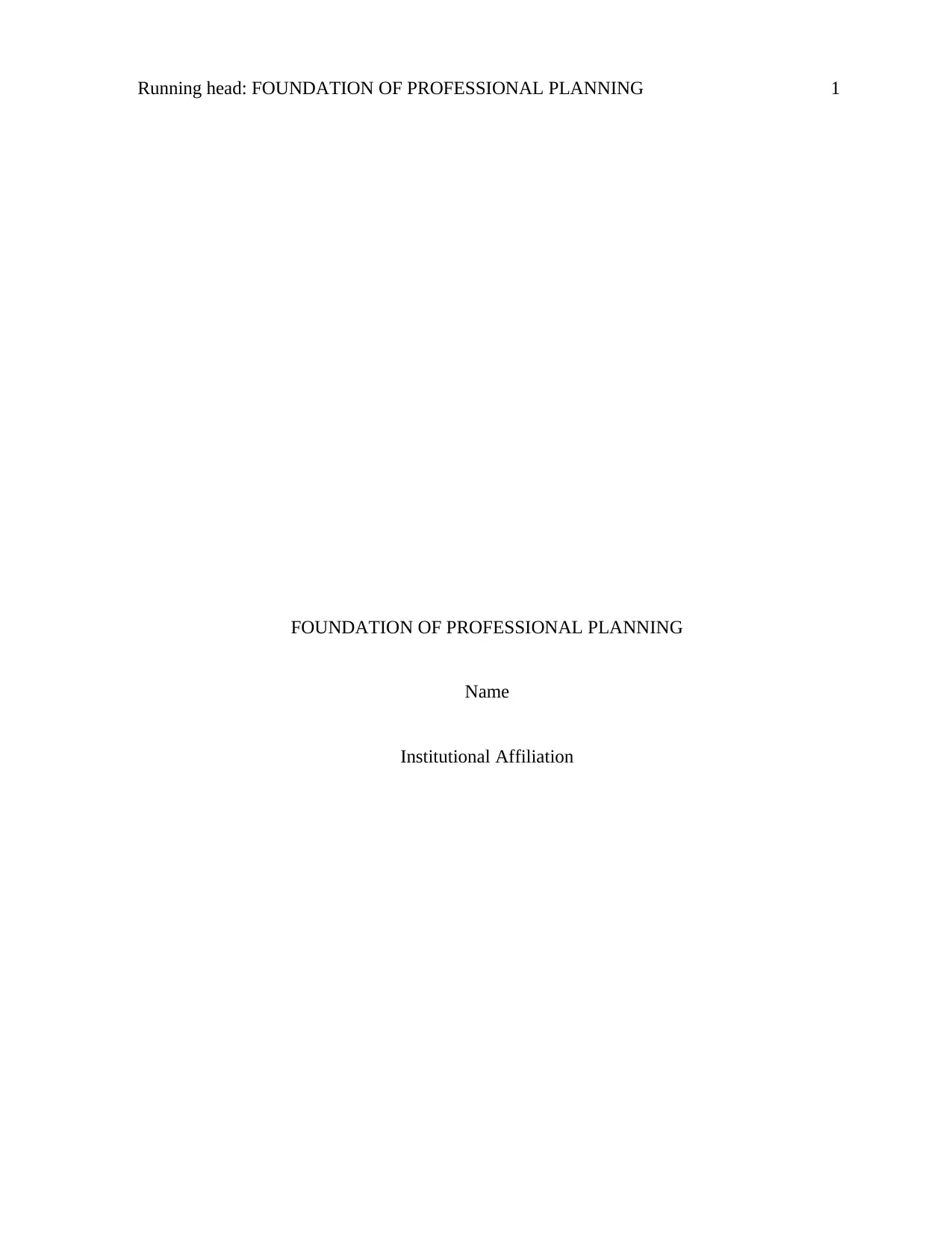
Running head: FOUNDATION OF PROFESSIONAL PLANNING 1
FOUNDATION OF PROFESSIONAL PLANNING
Name
Institutional Affiliation
FOUNDATION OF PROFESSIONAL PLANNING
Name
Institutional Affiliation
Paraphrase This Document
Need a fresh take? Get an instant paraphrase of this document with our AI Paraphraser
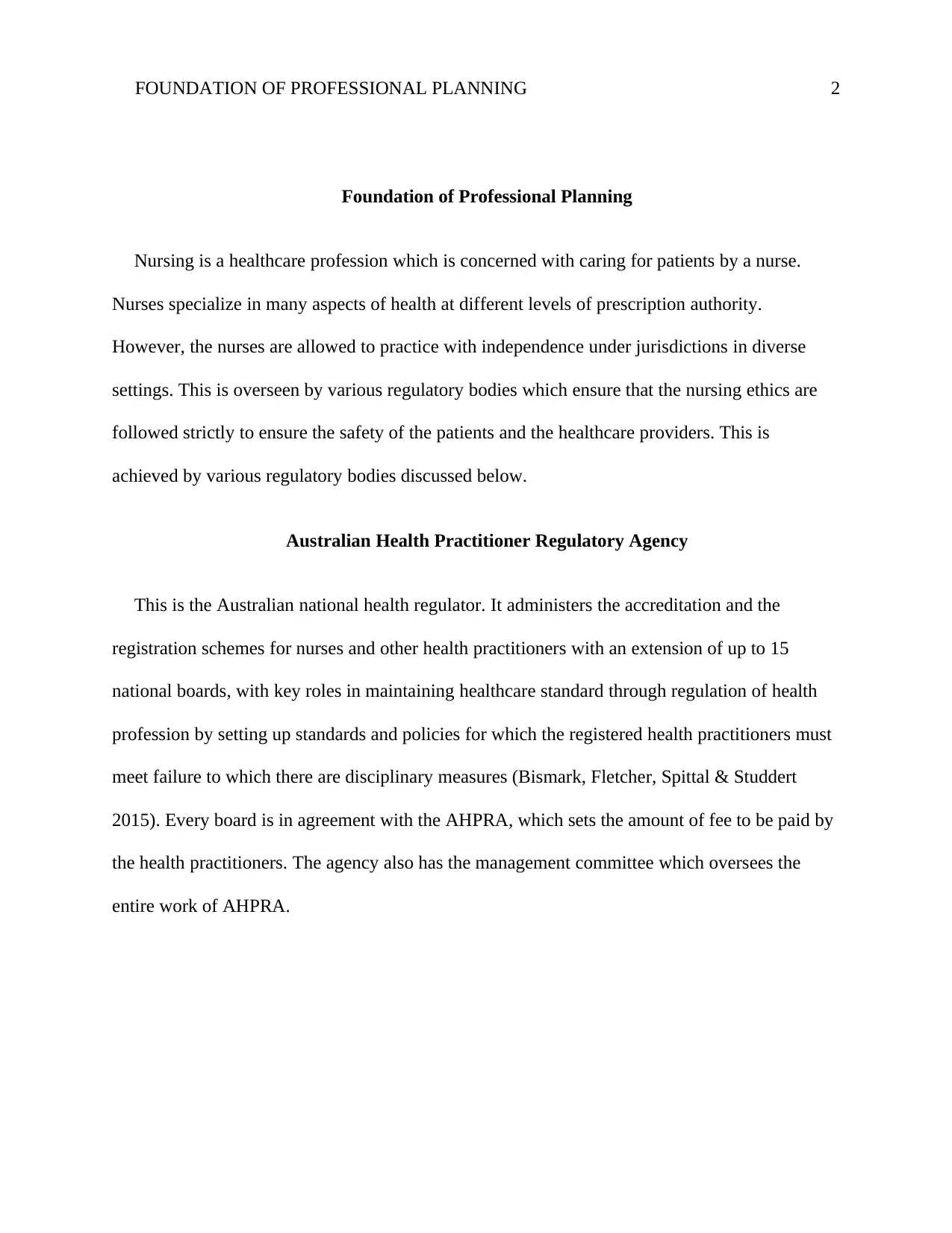
FOUNDATION OF PROFESSIONAL PLANNING 2
Foundation of Professional Planning
Nursing is a healthcare profession which is concerned with caring for patients by a nurse.
Nurses specialize in many aspects of health at different levels of prescription authority.
However, the nurses are allowed to practice with independence under jurisdictions in diverse
settings. This is overseen by various regulatory bodies which ensure that the nursing ethics are
followed strictly to ensure the safety of the patients and the healthcare providers. This is
achieved by various regulatory bodies discussed below.
Australian Health Practitioner Regulatory Agency
This is the Australian national health regulator. It administers the accreditation and the
registration schemes for nurses and other health practitioners with an extension of up to 15
national boards, with key roles in maintaining healthcare standard through regulation of health
profession by setting up standards and policies for which the registered health practitioners must
meet failure to which there are disciplinary measures (Bismark, Fletcher, Spittal & Studdert
2015). Every board is in agreement with the AHPRA, which sets the amount of fee to be paid by
the health practitioners. The agency also has the management committee which oversees the
entire work of AHPRA.
Foundation of Professional Planning
Nursing is a healthcare profession which is concerned with caring for patients by a nurse.
Nurses specialize in many aspects of health at different levels of prescription authority.
However, the nurses are allowed to practice with independence under jurisdictions in diverse
settings. This is overseen by various regulatory bodies which ensure that the nursing ethics are
followed strictly to ensure the safety of the patients and the healthcare providers. This is
achieved by various regulatory bodies discussed below.
Australian Health Practitioner Regulatory Agency
This is the Australian national health regulator. It administers the accreditation and the
registration schemes for nurses and other health practitioners with an extension of up to 15
national boards, with key roles in maintaining healthcare standard through regulation of health
profession by setting up standards and policies for which the registered health practitioners must
meet failure to which there are disciplinary measures (Bismark, Fletcher, Spittal & Studdert
2015). Every board is in agreement with the AHPRA, which sets the amount of fee to be paid by
the health practitioners. The agency also has the management committee which oversees the
entire work of AHPRA.
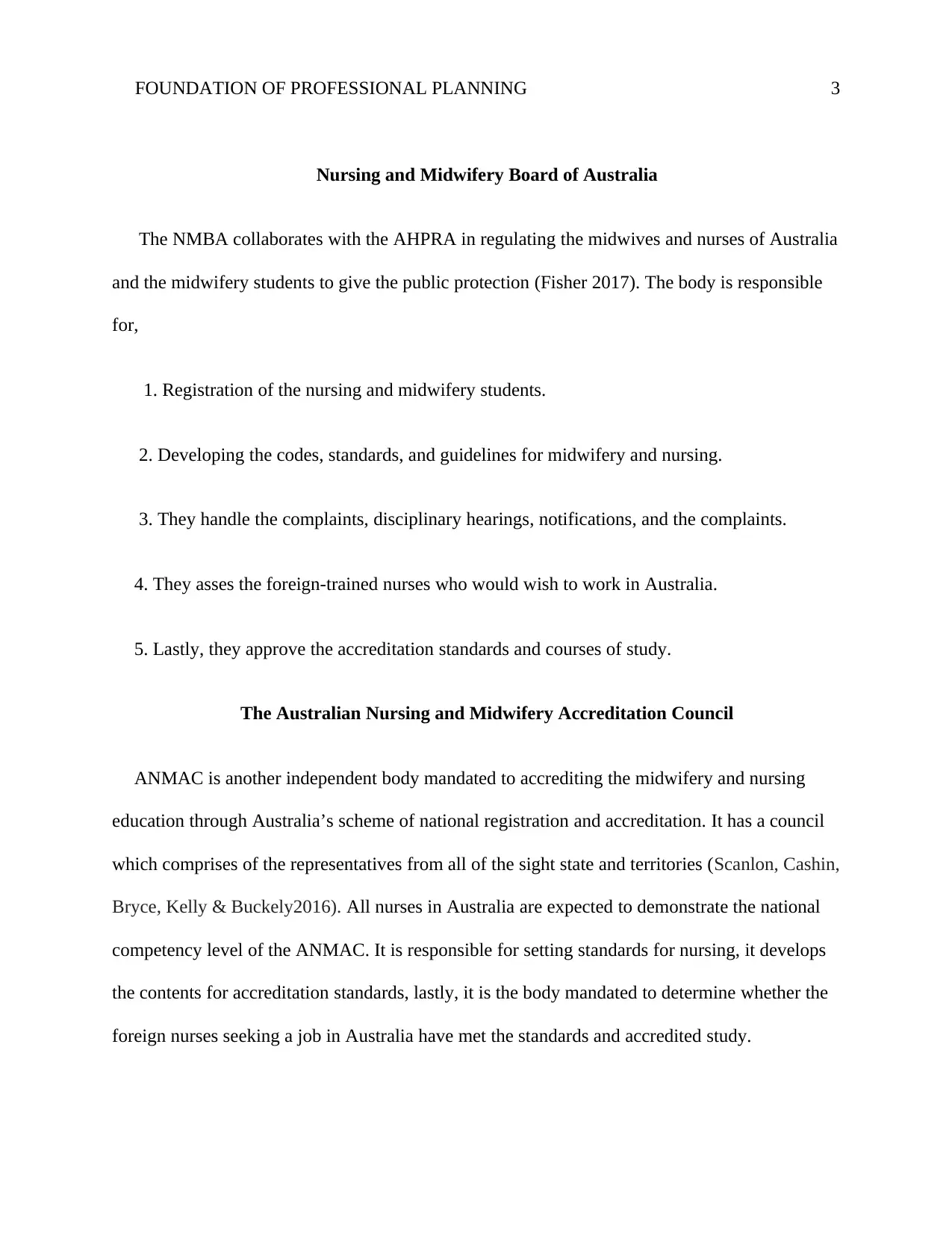
FOUNDATION OF PROFESSIONAL PLANNING 3
Nursing and Midwifery Board of Australia
The NMBA collaborates with the AHPRA in regulating the midwives and nurses of Australia
and the midwifery students to give the public protection (Fisher 2017). The body is responsible
for,
1. Registration of the nursing and midwifery students.
2. Developing the codes, standards, and guidelines for midwifery and nursing.
3. They handle the complaints, disciplinary hearings, notifications, and the complaints.
4. They asses the foreign-trained nurses who would wish to work in Australia.
5. Lastly, they approve the accreditation standards and courses of study.
The Australian Nursing and Midwifery Accreditation Council
ANMAC is another independent body mandated to accrediting the midwifery and nursing
education through Australia’s scheme of national registration and accreditation. It has a council
which comprises of the representatives from all of the sight state and territories (Scanlon, Cashin,
Bryce, Kelly & Buckely2016). All nurses in Australia are expected to demonstrate the national
competency level of the ANMAC. It is responsible for setting standards for nursing, it develops
the contents for accreditation standards, lastly, it is the body mandated to determine whether the
foreign nurses seeking a job in Australia have met the standards and accredited study.
Nursing and Midwifery Board of Australia
The NMBA collaborates with the AHPRA in regulating the midwives and nurses of Australia
and the midwifery students to give the public protection (Fisher 2017). The body is responsible
for,
1. Registration of the nursing and midwifery students.
2. Developing the codes, standards, and guidelines for midwifery and nursing.
3. They handle the complaints, disciplinary hearings, notifications, and the complaints.
4. They asses the foreign-trained nurses who would wish to work in Australia.
5. Lastly, they approve the accreditation standards and courses of study.
The Australian Nursing and Midwifery Accreditation Council
ANMAC is another independent body mandated to accrediting the midwifery and nursing
education through Australia’s scheme of national registration and accreditation. It has a council
which comprises of the representatives from all of the sight state and territories (Scanlon, Cashin,
Bryce, Kelly & Buckely2016). All nurses in Australia are expected to demonstrate the national
competency level of the ANMAC. It is responsible for setting standards for nursing, it develops
the contents for accreditation standards, lastly, it is the body mandated to determine whether the
foreign nurses seeking a job in Australia have met the standards and accredited study.
⊘ This is a preview!⊘
Do you want full access?
Subscribe today to unlock all pages.

Trusted by 1+ million students worldwide
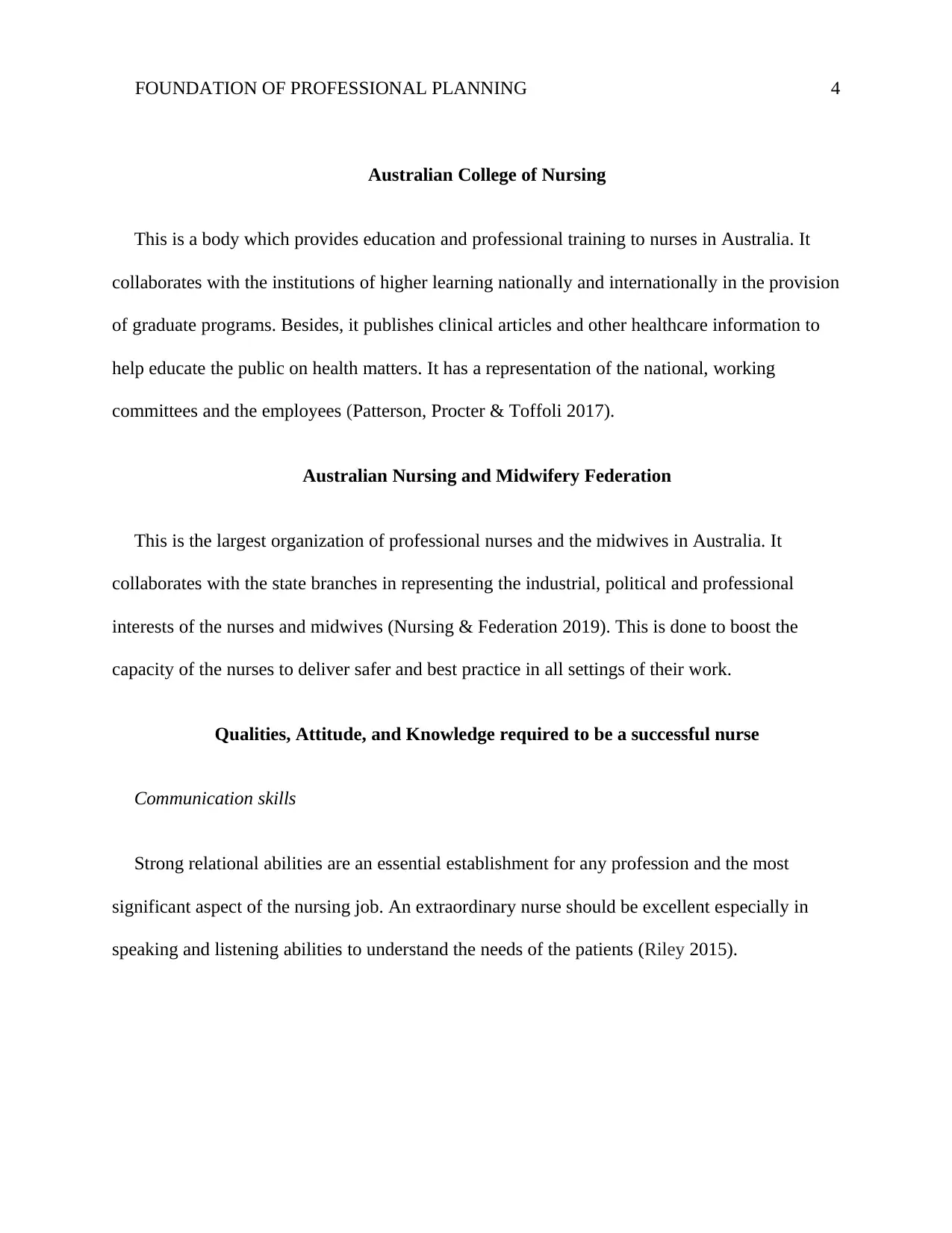
FOUNDATION OF PROFESSIONAL PLANNING 4
Australian College of Nursing
This is a body which provides education and professional training to nurses in Australia. It
collaborates with the institutions of higher learning nationally and internationally in the provision
of graduate programs. Besides, it publishes clinical articles and other healthcare information to
help educate the public on health matters. It has a representation of the national, working
committees and the employees (Patterson, Procter & Toffoli 2017).
Australian Nursing and Midwifery Federation
This is the largest organization of professional nurses and the midwives in Australia. It
collaborates with the state branches in representing the industrial, political and professional
interests of the nurses and midwives (Nursing & Federation 2019). This is done to boost the
capacity of the nurses to deliver safer and best practice in all settings of their work.
Qualities, Attitude, and Knowledge required to be a successful nurse
Communication skills
Strong relational abilities are an essential establishment for any profession and the most
significant aspect of the nursing job. An extraordinary nurse should be excellent especially in
speaking and listening abilities to understand the needs of the patients (Riley 2015).
Australian College of Nursing
This is a body which provides education and professional training to nurses in Australia. It
collaborates with the institutions of higher learning nationally and internationally in the provision
of graduate programs. Besides, it publishes clinical articles and other healthcare information to
help educate the public on health matters. It has a representation of the national, working
committees and the employees (Patterson, Procter & Toffoli 2017).
Australian Nursing and Midwifery Federation
This is the largest organization of professional nurses and the midwives in Australia. It
collaborates with the state branches in representing the industrial, political and professional
interests of the nurses and midwives (Nursing & Federation 2019). This is done to boost the
capacity of the nurses to deliver safer and best practice in all settings of their work.
Qualities, Attitude, and Knowledge required to be a successful nurse
Communication skills
Strong relational abilities are an essential establishment for any profession and the most
significant aspect of the nursing job. An extraordinary nurse should be excellent especially in
speaking and listening abilities to understand the needs of the patients (Riley 2015).
Paraphrase This Document
Need a fresh take? Get an instant paraphrase of this document with our AI Paraphraser
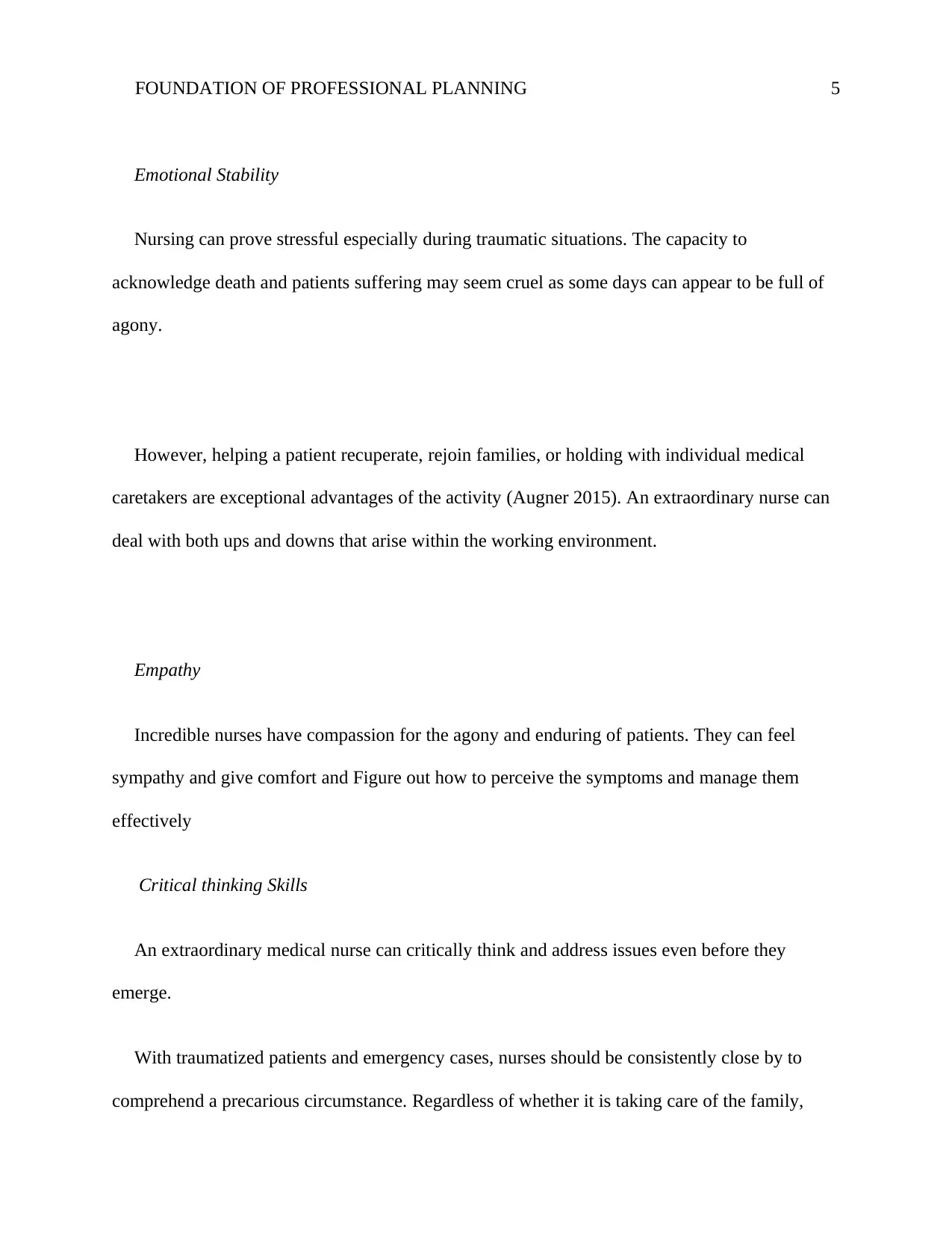
FOUNDATION OF PROFESSIONAL PLANNING 5
Emotional Stability
Nursing can prove stressful especially during traumatic situations. The capacity to
acknowledge death and patients suffering may seem cruel as some days can appear to be full of
agony.
However, helping a patient recuperate, rejoin families, or holding with individual medical
caretakers are exceptional advantages of the activity (Augner 2015). An extraordinary nurse can
deal with both ups and downs that arise within the working environment.
Empathy
Incredible nurses have compassion for the agony and enduring of patients. They can feel
sympathy and give comfort and Figure out how to perceive the symptoms and manage them
effectively
Critical thinking Skills
An extraordinary medical nurse can critically think and address issues even before they
emerge.
With traumatized patients and emergency cases, nurses should be consistently close by to
comprehend a precarious circumstance. Regardless of whether it is taking care of the family,
Emotional Stability
Nursing can prove stressful especially during traumatic situations. The capacity to
acknowledge death and patients suffering may seem cruel as some days can appear to be full of
agony.
However, helping a patient recuperate, rejoin families, or holding with individual medical
caretakers are exceptional advantages of the activity (Augner 2015). An extraordinary nurse can
deal with both ups and downs that arise within the working environment.
Empathy
Incredible nurses have compassion for the agony and enduring of patients. They can feel
sympathy and give comfort and Figure out how to perceive the symptoms and manage them
effectively
Critical thinking Skills
An extraordinary medical nurse can critically think and address issues even before they
emerge.
With traumatized patients and emergency cases, nurses should be consistently close by to
comprehend a precarious circumstance. Regardless of whether it is taking care of the family,
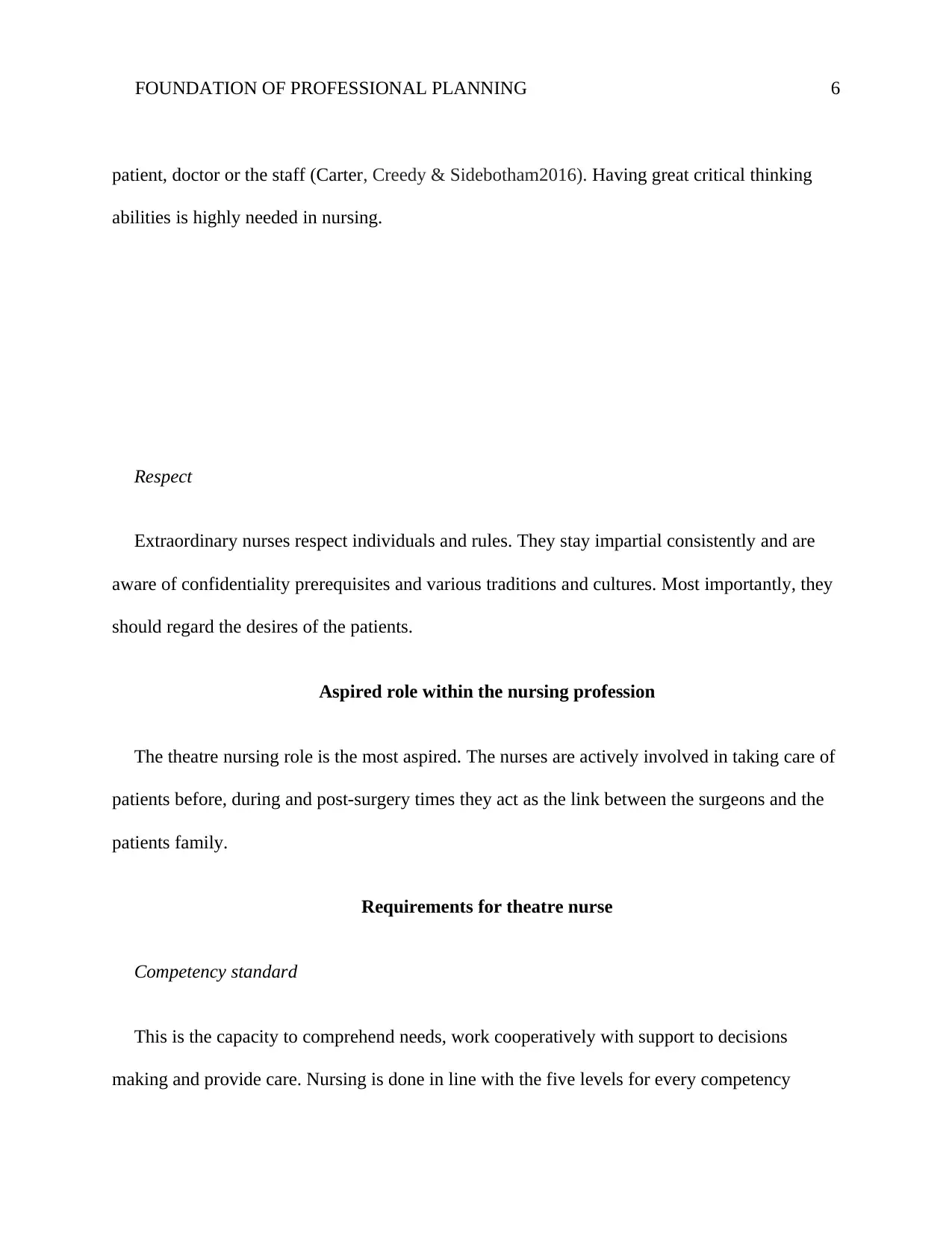
FOUNDATION OF PROFESSIONAL PLANNING 6
patient, doctor or the staff (Carter, Creedy & Sidebotham2016). Having great critical thinking
abilities is highly needed in nursing.
Respect
Extraordinary nurses respect individuals and rules. They stay impartial consistently and are
aware of confidentiality prerequisites and various traditions and cultures. Most importantly, they
should regard the desires of the patients.
Aspired role within the nursing profession
The theatre nursing role is the most aspired. The nurses are actively involved in taking care of
patients before, during and post-surgery times they act as the link between the surgeons and the
patients family.
Requirements for theatre nurse
Competency standard
This is the capacity to comprehend needs, work cooperatively with support to decisions
making and provide care. Nursing is done in line with the five levels for every competency
patient, doctor or the staff (Carter, Creedy & Sidebotham2016). Having great critical thinking
abilities is highly needed in nursing.
Respect
Extraordinary nurses respect individuals and rules. They stay impartial consistently and are
aware of confidentiality prerequisites and various traditions and cultures. Most importantly, they
should regard the desires of the patients.
Aspired role within the nursing profession
The theatre nursing role is the most aspired. The nurses are actively involved in taking care of
patients before, during and post-surgery times they act as the link between the surgeons and the
patients family.
Requirements for theatre nurse
Competency standard
This is the capacity to comprehend needs, work cooperatively with support to decisions
making and provide care. Nursing is done in line with the five levels for every competency
⊘ This is a preview!⊘
Do you want full access?
Subscribe today to unlock all pages.

Trusted by 1+ million students worldwide
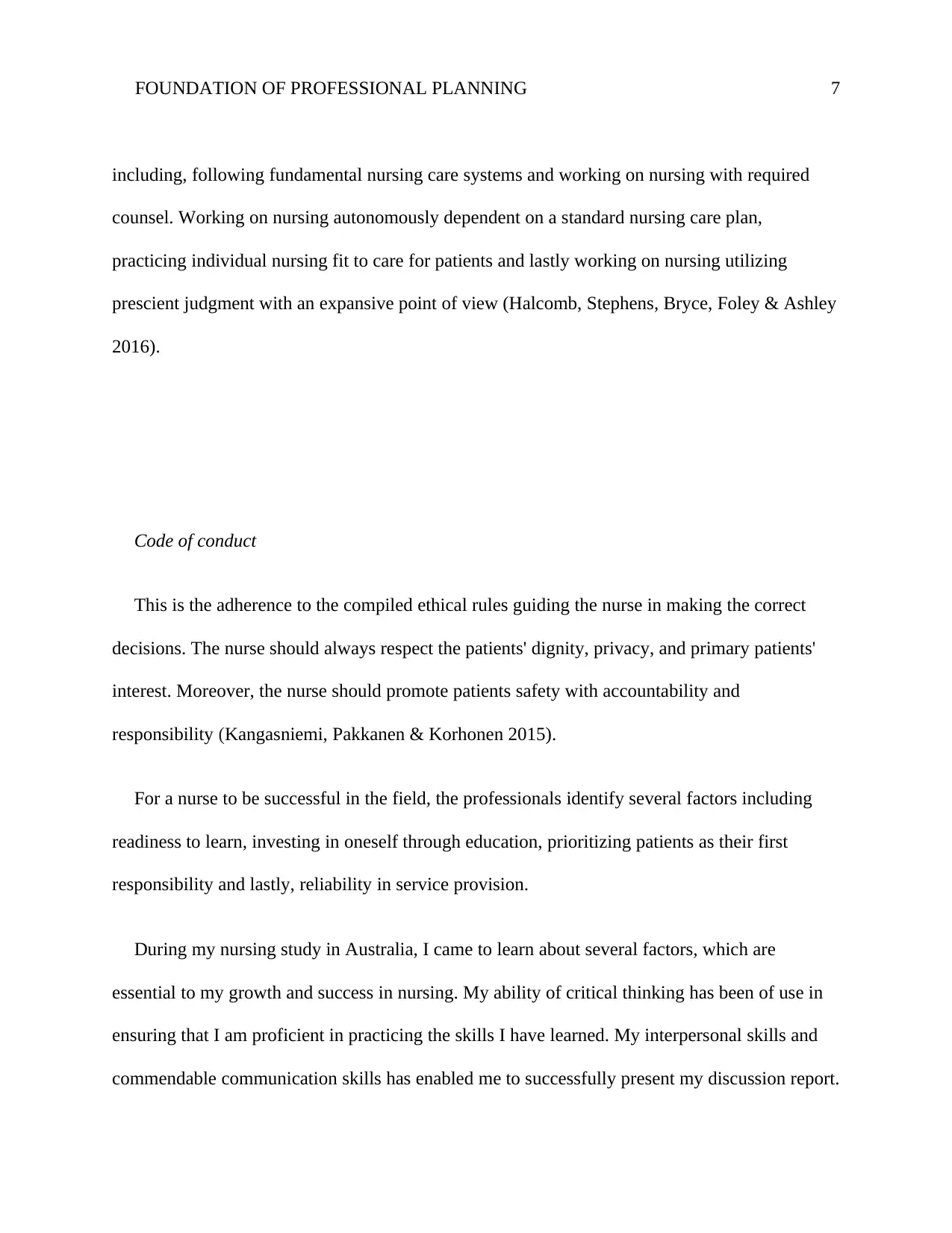
FOUNDATION OF PROFESSIONAL PLANNING 7
including, following fundamental nursing care systems and working on nursing with required
counsel. Working on nursing autonomously dependent on a standard nursing care plan,
practicing individual nursing fit to care for patients and lastly working on nursing utilizing
prescient judgment with an expansive point of view (Halcomb, Stephens, Bryce, Foley & Ashley
2016).
Code of conduct
This is the adherence to the compiled ethical rules guiding the nurse in making the correct
decisions. The nurse should always respect the patients' dignity, privacy, and primary patients'
interest. Moreover, the nurse should promote patients safety with accountability and
responsibility (Kangasniemi, Pakkanen & Korhonen 2015).
For a nurse to be successful in the field, the professionals identify several factors including
readiness to learn, investing in oneself through education, prioritizing patients as their first
responsibility and lastly, reliability in service provision.
During my nursing study in Australia, I came to learn about several factors, which are
essential to my growth and success in nursing. My ability of critical thinking has been of use in
ensuring that I am proficient in practicing the skills I have learned. My interpersonal skills and
commendable communication skills has enabled me to successfully present my discussion report.
including, following fundamental nursing care systems and working on nursing with required
counsel. Working on nursing autonomously dependent on a standard nursing care plan,
practicing individual nursing fit to care for patients and lastly working on nursing utilizing
prescient judgment with an expansive point of view (Halcomb, Stephens, Bryce, Foley & Ashley
2016).
Code of conduct
This is the adherence to the compiled ethical rules guiding the nurse in making the correct
decisions. The nurse should always respect the patients' dignity, privacy, and primary patients'
interest. Moreover, the nurse should promote patients safety with accountability and
responsibility (Kangasniemi, Pakkanen & Korhonen 2015).
For a nurse to be successful in the field, the professionals identify several factors including
readiness to learn, investing in oneself through education, prioritizing patients as their first
responsibility and lastly, reliability in service provision.
During my nursing study in Australia, I came to learn about several factors, which are
essential to my growth and success in nursing. My ability of critical thinking has been of use in
ensuring that I am proficient in practicing the skills I have learned. My interpersonal skills and
commendable communication skills has enabled me to successfully present my discussion report.
Paraphrase This Document
Need a fresh take? Get an instant paraphrase of this document with our AI Paraphraser
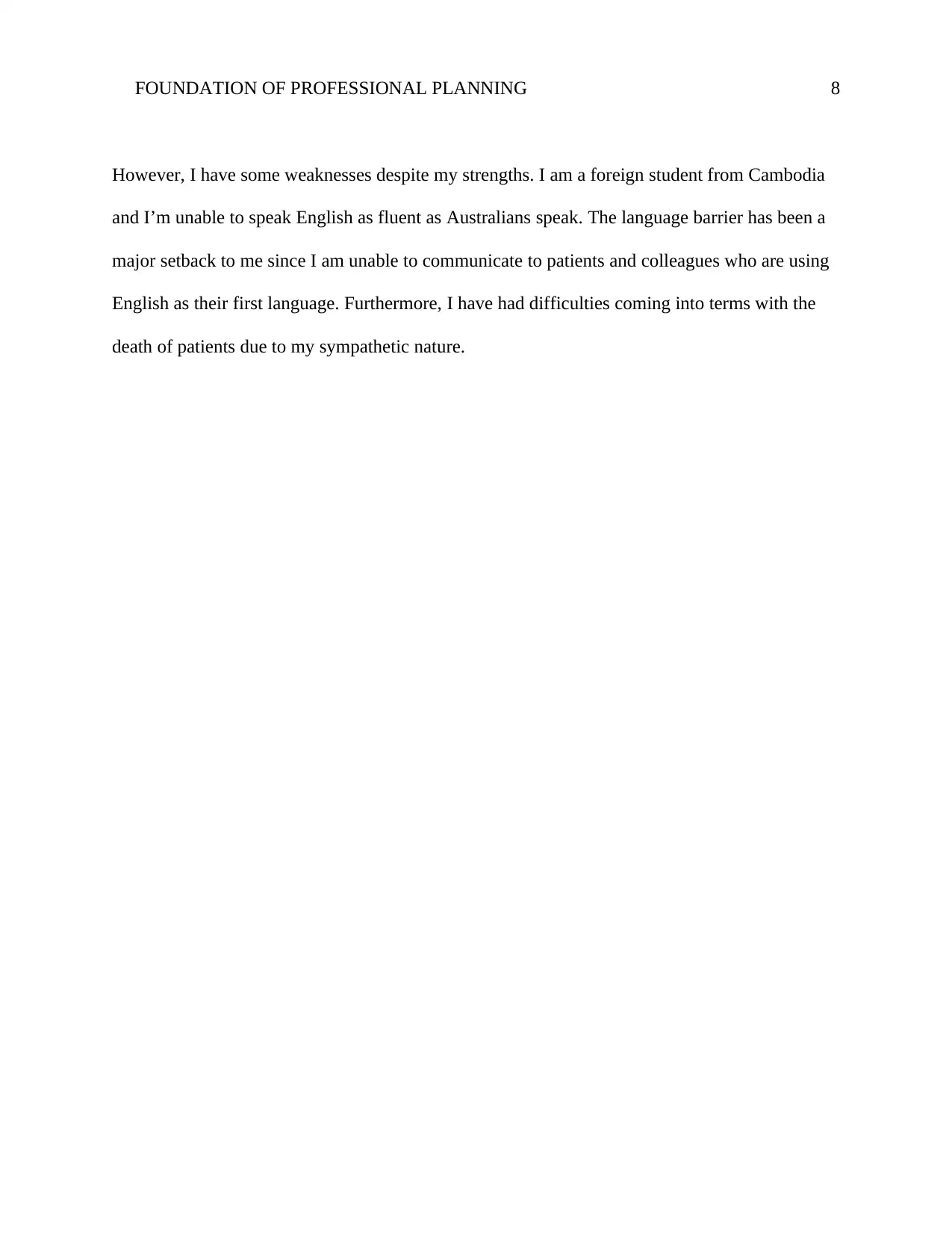
FOUNDATION OF PROFESSIONAL PLANNING 8
However, I have some weaknesses despite my strengths. I am a foreign student from Cambodia
and I’m unable to speak English as fluent as Australians speak. The language barrier has been a
major setback to me since I am unable to communicate to patients and colleagues who are using
English as their first language. Furthermore, I have had difficulties coming into terms with the
death of patients due to my sympathetic nature.
However, I have some weaknesses despite my strengths. I am a foreign student from Cambodia
and I’m unable to speak English as fluent as Australians speak. The language barrier has been a
major setback to me since I am unable to communicate to patients and colleagues who are using
English as their first language. Furthermore, I have had difficulties coming into terms with the
death of patients due to my sympathetic nature.
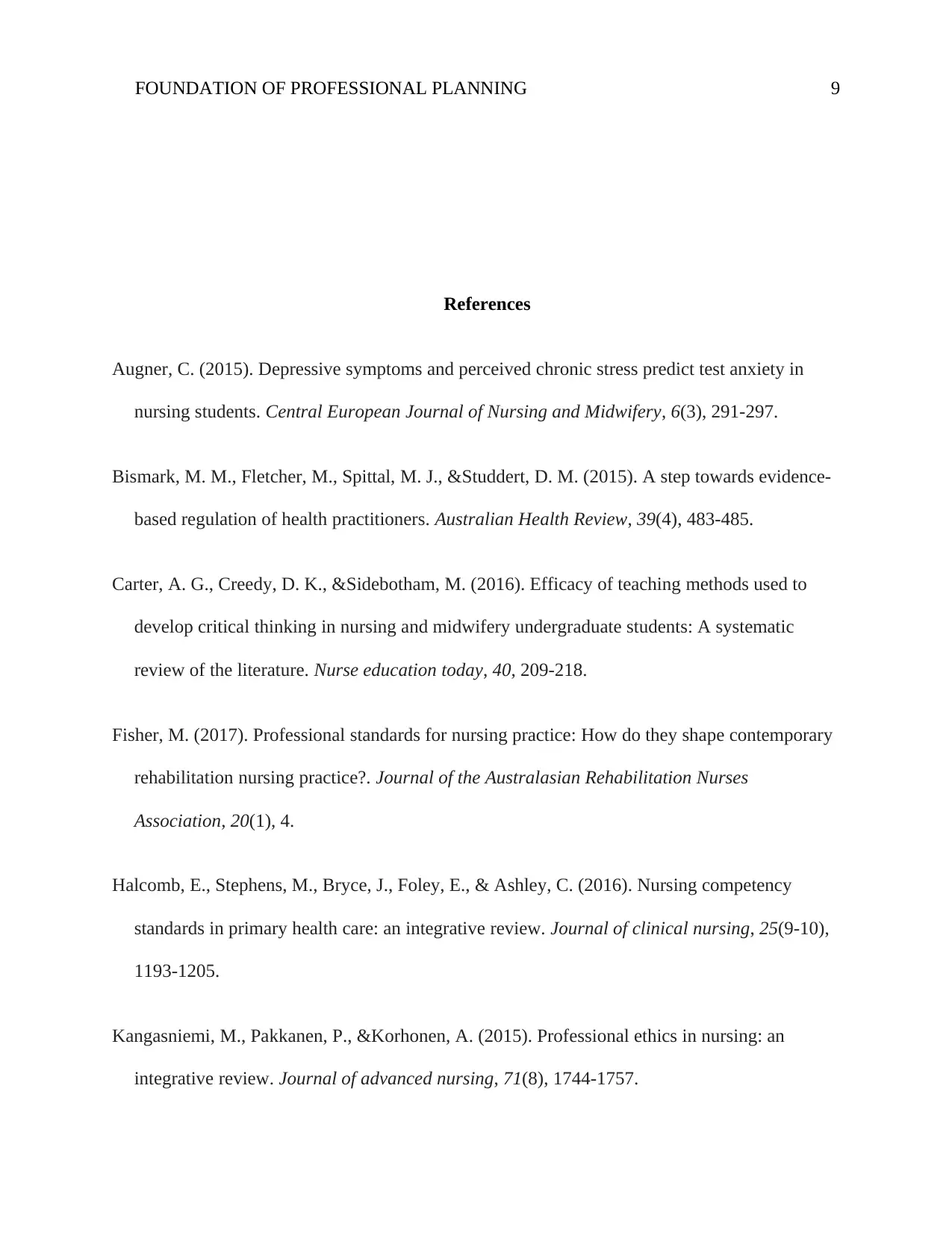
FOUNDATION OF PROFESSIONAL PLANNING 9
References
Augner, C. (2015). Depressive symptoms and perceived chronic stress predict test anxiety in
nursing students. Central European Journal of Nursing and Midwifery, 6(3), 291-297.
Bismark, M. M., Fletcher, M., Spittal, M. J., &Studdert, D. M. (2015). A step towards evidence-
based regulation of health practitioners. Australian Health Review, 39(4), 483-485.
Carter, A. G., Creedy, D. K., &Sidebotham, M. (2016). Efficacy of teaching methods used to
develop critical thinking in nursing and midwifery undergraduate students: A systematic
review of the literature. Nurse education today, 40, 209-218.
Fisher, M. (2017). Professional standards for nursing practice: How do they shape contemporary
rehabilitation nursing practice?. Journal of the Australasian Rehabilitation Nurses
Association, 20(1), 4.
Halcomb, E., Stephens, M., Bryce, J., Foley, E., & Ashley, C. (2016). Nursing competency
standards in primary health care: an integrative review. Journal of clinical nursing, 25(9-10),
1193-1205.
Kangasniemi, M., Pakkanen, P., &Korhonen, A. (2015). Professional ethics in nursing: an
integrative review. Journal of advanced nursing, 71(8), 1744-1757.
References
Augner, C. (2015). Depressive symptoms and perceived chronic stress predict test anxiety in
nursing students. Central European Journal of Nursing and Midwifery, 6(3), 291-297.
Bismark, M. M., Fletcher, M., Spittal, M. J., &Studdert, D. M. (2015). A step towards evidence-
based regulation of health practitioners. Australian Health Review, 39(4), 483-485.
Carter, A. G., Creedy, D. K., &Sidebotham, M. (2016). Efficacy of teaching methods used to
develop critical thinking in nursing and midwifery undergraduate students: A systematic
review of the literature. Nurse education today, 40, 209-218.
Fisher, M. (2017). Professional standards for nursing practice: How do they shape contemporary
rehabilitation nursing practice?. Journal of the Australasian Rehabilitation Nurses
Association, 20(1), 4.
Halcomb, E., Stephens, M., Bryce, J., Foley, E., & Ashley, C. (2016). Nursing competency
standards in primary health care: an integrative review. Journal of clinical nursing, 25(9-10),
1193-1205.
Kangasniemi, M., Pakkanen, P., &Korhonen, A. (2015). Professional ethics in nursing: an
integrative review. Journal of advanced nursing, 71(8), 1744-1757.
⊘ This is a preview!⊘
Do you want full access?
Subscribe today to unlock all pages.

Trusted by 1+ million students worldwide
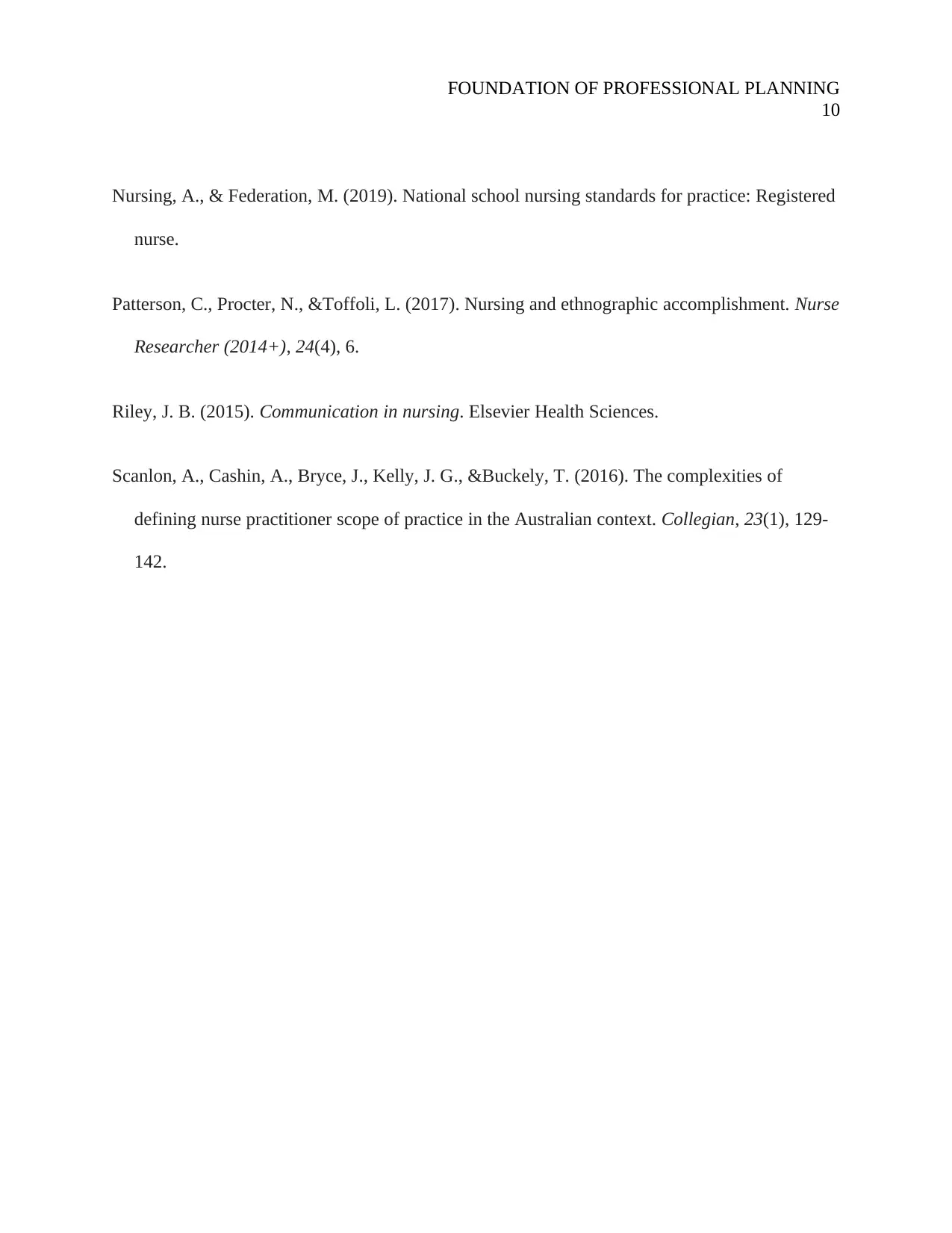
FOUNDATION OF PROFESSIONAL PLANNING
10
Nursing, A., & Federation, M. (2019). National school nursing standards for practice: Registered
nurse.
Patterson, C., Procter, N., &Toffoli, L. (2017). Nursing and ethnographic accomplishment. Nurse
Researcher (2014+), 24(4), 6.
Riley, J. B. (2015). Communication in nursing. Elsevier Health Sciences.
Scanlon, A., Cashin, A., Bryce, J., Kelly, J. G., &Buckely, T. (2016). The complexities of
defining nurse practitioner scope of practice in the Australian context. Collegian, 23(1), 129-
142.
10
Nursing, A., & Federation, M. (2019). National school nursing standards for practice: Registered
nurse.
Patterson, C., Procter, N., &Toffoli, L. (2017). Nursing and ethnographic accomplishment. Nurse
Researcher (2014+), 24(4), 6.
Riley, J. B. (2015). Communication in nursing. Elsevier Health Sciences.
Scanlon, A., Cashin, A., Bryce, J., Kelly, J. G., &Buckely, T. (2016). The complexities of
defining nurse practitioner scope of practice in the Australian context. Collegian, 23(1), 129-
142.
1 out of 10
Related Documents
Your All-in-One AI-Powered Toolkit for Academic Success.
+13062052269
info@desklib.com
Available 24*7 on WhatsApp / Email
![[object Object]](/_next/static/media/star-bottom.7253800d.svg)
Unlock your academic potential
Copyright © 2020–2026 A2Z Services. All Rights Reserved. Developed and managed by ZUCOL.





